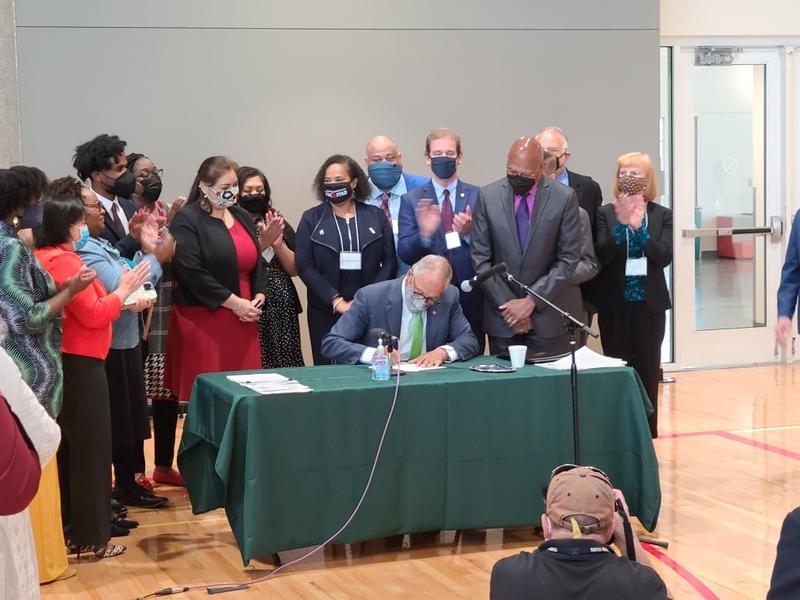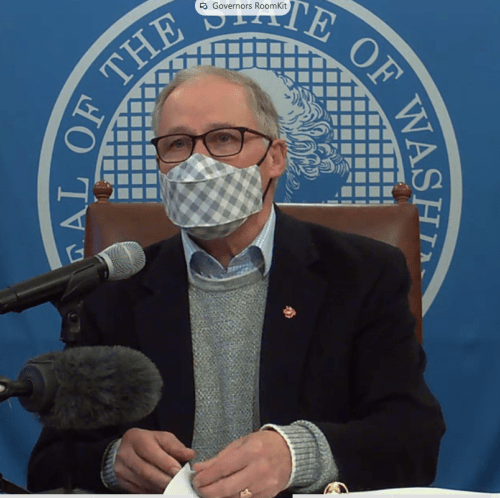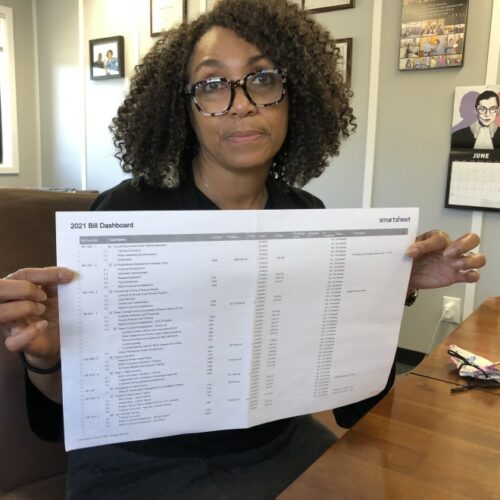
Flanked By Families, Washington Governor Signs A Dozen Police Reform Bills Into Law
READ ON
Calling it a “moral mandate,” Gov. Jay Inslee on Tuesday signed into law a dozen bills that backers hope will improve policing in Washington, reduce the use of deadly force and ensure that when deadly encounters do occur the investigations are thorough and independent.
“These bills are all going to work in coordination with one another to create a system of accountability and integrity stronger than anywhere else in the nation,” Inslee said in remarks before he signed the bills.
The Legislature passed the police accountability measures in response to sweeping calls, nationally and locally, to reform policing following the killings of Black Americans like George Floyd in Minneapolis and Breonna Taylor in Louisville. In Washington, the death of Manuel Ellis at the hands of Tacoma police in March 2020 also galvanized reform efforts.
“We knew we had to do something,” said Democratic state Rep. Jesse Johnson, the vice chair of the House Public Safety Committee and sponsor of three of the bills, in a recent interview on TVW’s “Inside Olympia” program.
In crafting the bills, Democratic lawmakers worked closely with advocates and families who have lost loved ones to police violence. Some of those families attended the bill signing ceremony at the Eastside Community Center in Tacoma.
“It is my hope that other families will not have to endure what I did in order to get justice and reclaim my son’s legacy,” said Sonia Joseph of the Washington Coalition for Police Accountability whose 20-year-old son Giovonn Joseph-McDade was killed by Kent police in 2017.
The focus of the bills runs the gamut from the tactics officers use in the field to how deadly force incidents are investigated to the circumstances under which officers can be decertified.
They include:
- A bill that bans the use of chokeholds and neck restraints by officers, restricts the use of tear gas by police and prohibits police agencies from acquiring military equipment. The bill also requires uniformed officers to be identifiable to citizens, bars vehicle pursuits except in certain exigent circumstances and bans the use of no-knock search warrants. Additionally, the bill creates a workgroup to develop a statewide policy on the training and use of police dogs.
- A measure that establishes a new Office of Independent Investigations within the governor’s office to investigate police deadly force incidents that occur after July 1, 2022. The office will have the authority to investigate earlier incidents if new evidence comes to light. The office will have a director, a team of non-law enforcement investigators and be overseen by an 11-member advisory board. In addition to training on how to conduct criminal investigations, the investigators will also receive training on topics such as the history of racism in policing and implicit and explicit bias.
- A “reasonable care” standard that requires officers to employ de-escalation tactics, use the least amount of physical force necessary and limits the use of deadly force to situations where there’s an imminent threat of serious injury or death. The bill requires the Attorney General’s office to publish model policies on use of force and de-escalation by July 1, 2022 and that by December 1 of that year all law enforcement agencies adopt policies consistent with that guidance.
- Sweeping changes to the state’s Criminal Justice Training Commission (CJTC) which trains and certifies peace officers in Washington. Under this bill, CJTC’s mission will expand to focus broadly on the integrity, effectiveness and professionalism of police officers with the goal of promoting public trust and confidence. To that end, the commission itself will expand from 16 to 21 members and add civilians so that the majority of the membership is made up of non-law enforcement representatives. CJTC’s authority will also be expanded to give it the ability to temporarily suspend a police officer’s certification and make it easier to decertify an officer for misconduct. The bill also expands background checks for would-be officers and creates a publicly searchable database of complaints and disciplinary actions against officers. One of the goals of the legislation is to prevent problematic officers from moving from department to department.
- A requirement that officers intervene if they witness a fellow officer using excessive force and render first aid to the victim if needed. The bill also requires officers to report to a supervisor any wrongdoing they witness on the part of another officer. While individual departments may already have such policies in place, this creates a statewide mandate for all officers.
In a statement Tuesday, the Washington Black Lives Matter Alliance praised the suite of police accountability measures as a “potential sea change.” But the organization also cautioned that the next test will be in how the new laws are implemented.
“These laws must now be enforced. That’s up to police and prosecutors, judges and juries, administrators and adjudicators. And it’s up to us,” the statement said.
Other bills signed by Inslee on Tuesday will establish a statewide use of force database, ensure that police agencies notify prosecutors about officers with credibility issues and make it easier for families to sue the police over deadly force encounters.
Inslee also signed a bill that instructs the state auditor to review all completed deadly force investigations to ensure that rules and procedures were followed.
Two other bills signed by Inslee aim to give defendants additional protections. One requires police to electronically record interrogations of juveniles and interrogations of adults who face felony-level charges. The second requires police to give juveniles access to an attorney before they waive any constitutional rights or consent to be interrogated.
A final bill creates a state-funded grant program administered by the Department of Commerce to fund local projects aimed at building partnerships between communities and law enforcement. An example is the Pierce County Safe Streets program that works to reduce youth violence and provide personal safety education to vulnerable adults.
“All of these bills together I think are a constellation of efforts to create accountability and justice within the system, and I think it’s going to make things safer,” said Rep. Johnson who is a member of the Legislature’s Black Members Caucus.
Many Republicans, though, disagreed. In fact, state Sen. Mike Padden, the ranking Republican on the Senate Law and Justice Committee, went so far as to call the package of bills “hostile to law enforcement.”
Specifically, Padden criticized the ban on the Lateral Vascular Neck Restraint — a technique used by many departments nationally — which he argued if applied properly can be safe and effective.
“It’s a shame to see that tool taken out of the tool box,” Padden said on “Inside Olympia.” Padden also said the limits on vehicle pursuits go too far.
Regarding the handling of deadly force incidents, Padden said he would have liked to give changes adopted by the Legislature in 2019 more time to be fully implemented.
The package of reform measures also divided police groups. For instance, the Fraternal Order of Police said it could support some new restrictions that other groups did not.
In a carefully worded statement following the end of the legislative session, the Washington Association of Sheriffs and Police Chiefs (WASPC) said it “supports many of the concepts” passed by the Legislature.
Despite the plethora of bills that passed this year, a number did not. They include a measure to authorize the state Attorney General to prosecute cases of police deadly force, a bill to increase the minimum age of police recruits and a requirement that police departments with at least 15 officers to have a community oversight board.
Another bill, which was a top priority of families this year, would have made it easier to sue individual officers in state court for alleged constitutional violations by ending so-called qualified immunity.
Several, if not all, of those bills are likely to be reconsidered during the 2022 legislative session.
“This year was a first step toward greater accountability and justice in the system, but it’s definitely not the end. It’s just the floor, not the ceiling,” Johnson said.
Related Stories:

Gov. Inslee Signs Police Reform “Fix” Measures
Gov. Jay Inslee, pictured in this file photo, signed two measures that “fix” issues in the state’s police reform laws Listen Read Washington Governor Jay Inslee has signed into law

‘Cultural Changes Ahead’ For Police In Washington State, As Controversial Reform Takes Effect
New laws governing Washington State law enforcement took effect on Sunday, including their use of force (HB 1310) and tactics (HB 1054).
Some police departments in King County say new laws means they will no longer respond to certain calls; City of Seattle chief Adrian Diaz calls that “absurd.”

Police, Reformers Face Off Over Proposal To Ban Chokeholds And Military Equipment In Washington
A proposal to impose sweeping restrictions on police tactics and techniques in Washington is highlighting stark differences of opinion between police and reform groups. That divide was on display Tuesday in the House Public Safety committee during a lengthy, virtual public hearing on an omnibus bill sponsored by Democratic state Rep. Jesse Johnson.















